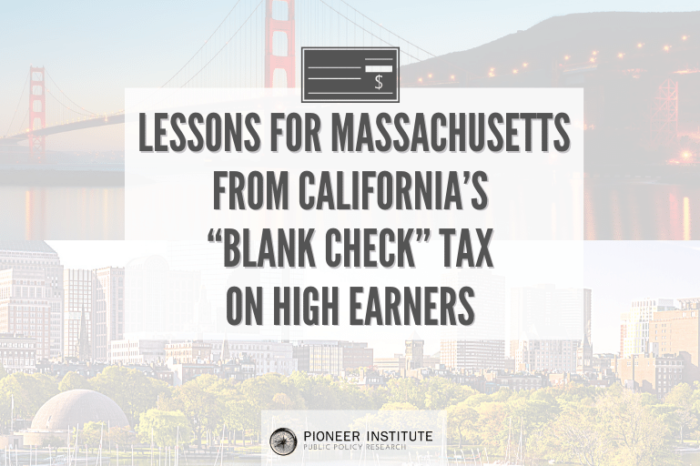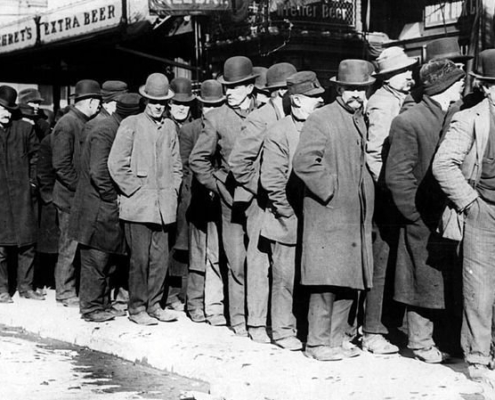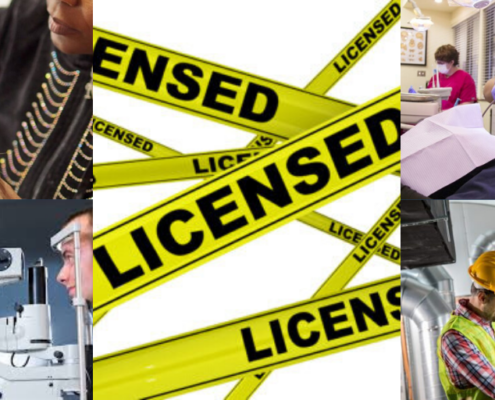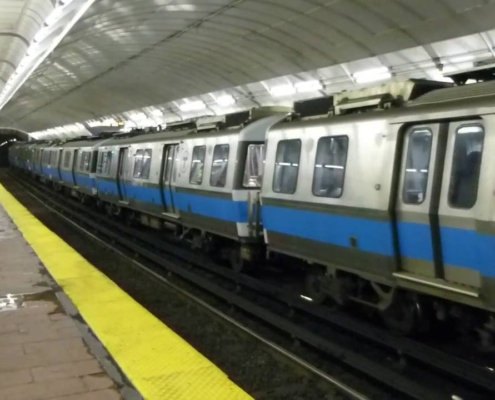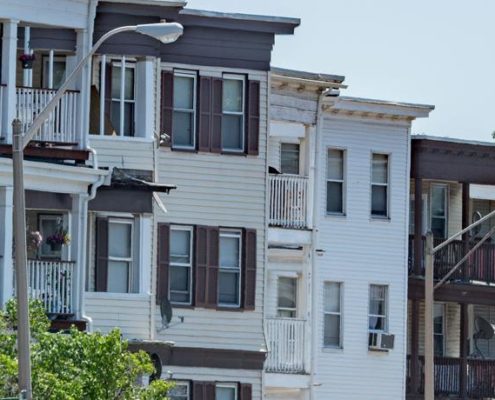Study Finds Massachusetts Graduated Income Tax May Be a “Blank Check” and Not Increase Funding for Designated Priorities
Read coverage of this report in the Boston Herald.
In California, revenue from a similar tax was diverted to the general fund, ballooning state employee payroll
BOSTON – Advocates claim a proposed 4 percent surtax on high earners will raise nearly $2 billion per year for education and transportation, but similar tax hikes in other states resulted in highly discretionary rather than targeted spending, according to a new report published by Pioneer Institute. That same result or worse is possible in Massachusetts because during the 2019 constitutional convention state legislators rejected — not just one, but two — proposed amendments requiring that the new revenues be directed to these purposes.
After a 2012 tax hike in California aimed to increase education investments, the state legislature dedicated little more than the minimum required by law to education and redirected the majority of the funds to general government operations. The result was a soaring state payroll.
“The Massachusetts surtax doesn’t actually require that the legislature increase spending on education and transportation,” said Greg Sullivan, who co-authored Lessons for Massachusetts from California’s “blank check” tax on high earners with Andrew Mikula. “In California, a separate amendment to that state’s constitution required that at least 40 percent be spent on education. There is no such requirement in Massachusetts, meaning overall state education and transportation funding is likely to remain essentially flat under the surtax, and could even decline.”
In November 2012, California voters adopted Proposition 30, an income tax hike on high earners, the revenue from which was to be dedicated to K-12 education and community colleges. But since it was adopted, annual funding for those purposes has exceeded California’s pre-existing constitutional minimum funding requirement by less than one-tenth of one percent. Over that same period, the number of teachers in the state increased by just a fraction of a percentage point.
When the proposed graduated surtax proposal came before the Massachusetts Supreme Judicial Court (SJC) in 2018, the late Chief Justice Ralph Gants asked counsel for the state Attorney General whether it was correct that passage of the income tax hike “may or may not result in any increase in transportation or education spending.” Counsel responded that the Chief Justice’s understanding was correct.
The Massachusetts Attorney General’s counsel submitted a brief to the SJC in 2018 stating that “the Legislature could choose to reduce funding in specified budget categories from other sources and replace it with the new surtax revenue.” In its decision, the court added, “We are not entirely unaware of the possibility that, as the plaintiffs argue, funding for education and transportation were added to the initiative petition as a means to “sweeten the pot” for voters.”
“This is exactly the flaw that was revealed when the SJC took up a similar proposal in 2018, and both the Attorney General’s Office and the late Chief Justice Ralph Gants pointed out that the measure doesn’t actually require any increase in education and transportation spending,” said Kevin Martin, the lead attorney in the 2018 case. “There’s no reason to believe what happened in California won’t happen in Massachusetts.”
At the June 2019 constitutional convention, two amendments (H86-1 and H86-11) sought to require that new surtax revenues go to education and transportation. They were rejected handily by state legislators, 40-156 and 39-154, respectively.
“The rejection of these amendments leaves Massachusetts without even the minimum funding requirements California has in place,” noted Pioneer Institute executive director Jim Stergios. “Through their votes, the legislature expressed very clearly that they intend to put the money into the General Fund. It’s the equivalent of a blank check.”
The California state payroll was a major beneficiary of the funds diverted from K-12 education and community colleges. According to the federal Bureau of Labor Statistics, while the number of state employees in Massachusetts increased by 0.3 percent from fiscal 2013 through fiscal 2019, and by an average of 1.8 percent in the other 48 states, the number of state employees in California jumped 10.6 percent.
Over the same period, state payroll spending rose 24 percent in Massachusetts, which was in line with a 24.4 percent average in the 48 other states. But over that time California’s payroll spending increased by 50.3 percent.
About the Authors
Gregory Sullivan is Pioneer’s Research Director. Prior to joining Pioneer, Sullivan served two five-year terms as Inspector General of the Commonwealth of Massachusetts and was a 17-year member of the Massachusetts House of Representatives. Greg is a Certified Fraud Investigator, and holds degrees from Harvard College, The Kennedy School of Public Administration, and the Sloan School at MIT.
Andrew Mikula is Economic Research Analyst at Pioneer Institute. Mr. Mikula was previously a Lovett & Ruth Peters Economic Opportunity Fellow at Pioneer Institute and studied economics at Bates College.
Pioneer’s mission is to develop and communicate dynamic ideas that advance prosperity and a vibrant civic life in Massachusetts and beyond.
Pioneer’s vision of success is a state and nation where our people can prosper and our society thrive because we enjoy world-class options in education, healthcare, transportation, and economic opportunity, and where our government is limited, accountable and transparent.
Pioneer values an America where our citizenry is well-educated and willing to test our beliefs based on facts and the free exchange of ideas, and committed to liberty, personal responsibility, and free enterprise.
Get Updates on Our Economic Opportunity Research
Related Posts

